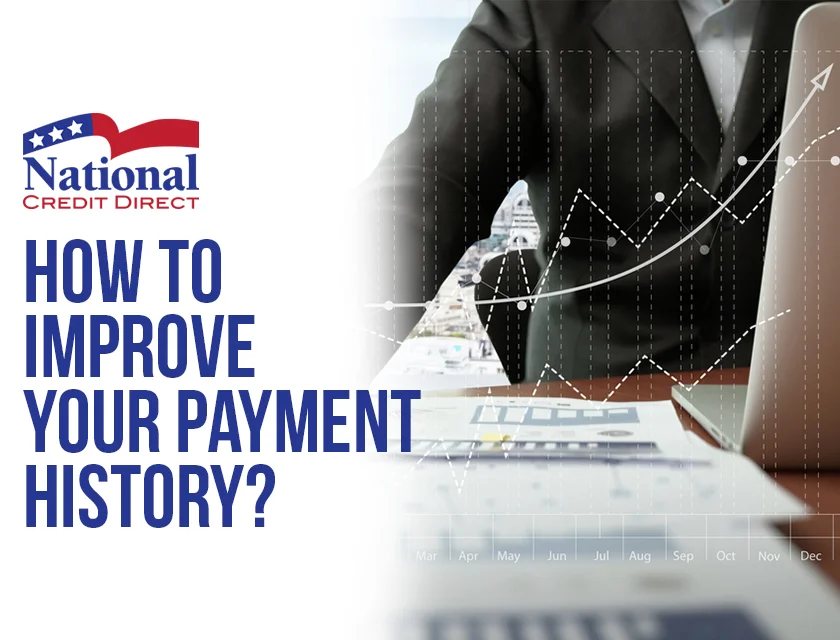How to Improve Your Payment History

Why It Matters:
Payment history profoundly influences your credit score, impacting your financial opportunities.
Understanding Payment History
Payment history is one the components and the most influential factor that affects your credit or FICO Score, constituting 35% of its total. This metric is a reflection of how consistently you pay your debts, including credit cards, loans, and retail accounts. It's vital because a solid payment history can lead to more favorable financial terms, such as lower interest rates and higher credit limits. Conversely, a poor payment history might restrict your access to credit and make loans more expensive.
Maintaining a spotless payment history is essential not only for obtaining new credit but also for securing favorable borrowing rates. It provides lenders with a clear and compelling picture of your financial responsibility, making it a key factor in all credit-related decisions. Rather than relying on credit repair companies, take control of your financial future by improving your credit on your own.
Tip: Monitor Your Credit Regularly
Regular monitoring of your credit report is essential to ensure all payments are accurately reported and to promptly address any discrepancies. This proactive approach helps maintain a healthy credit score and a positive financial reputation.
How Payment History Affects Your Credit Score
Why It Matters: Late payments can significantly decrease your credit score, influencing lending decisions and interest rates.
The Impact of Timeliness
Your payment history is the most critical factor in your credit scoring, accounting for approximately 35% of your FICO Score. Timely payments contribute positively, enhancing your creditworthiness in the eyes of lenders. Each payment made on time reinforces your reliability, whereas every late payment can decrease your score, making future credit more expensive or harder to secure.
The repercussions of late payments are notable—they can remain on your credit report for up to seven years. The immediate effect can be a drastic drop in your score, with the possibility of decreasing it by as much as 100 points, especially if you have a sparse credit history or other negative factors.
Tip: Set Up Alerts and Autopay
To avoid missing payments, consider setting up automatic payments for your recurring bills and activating alert notifications for upcoming dues. This will help maintain your payment schedule without the risk of human error.
Account Types Influencing Payment History
Why It Matters:
Understanding which accounts impact your credit score can help you prioritize financial management to enhance your credit standing.
Detailing Account Types and Their Impact
Payment history considers various types of credit accounts, each influencing your credit score differently. These include:
- Credit Cards: Regular, timely payments on credit card accounts are essential for keeping them in good standing. Conversely, late payments can significantly affect your credit score.
- Installment Loans: Whether it’s a car loan or a student loan, keeping up with fixed monthly payments is crucial. Completing these loans with a good payment record can boost your credit history.
- Mortgages: As a major financial commitment, mortgages require consistent on-time payments. They are heavily weighted in credit scoring due to the loan amounts and their duration.
- Retail Accounts: These accounts might seem minor, but they also contribute to your credit score. Managing these payments effectively can help maintain or improve your credit standing.
Each type of account plays a role in shaping your credit report's narrative, which in turn affects your overall credit health. Managing these accounts wisely by ensuring timely payments is fundamental to building a strong credit score.
Tip: Prioritize High-Impact Payments
Prioritize payments on accounts that impact your credit score the most, such as mortgages and large installment loans. Setting reminders for due dates or enrolling in autopay can ensure you never miss a payment, safeguarding your credit score.
Negative Impacts on Credit Scores
Why It Matters: Recognizing the detrimental effects of certain financial missteps on your credit report can help you avoid actions that significantly harm your credit standing.
Consequences of Bankruptcies and Collections
Bankruptcies and collections are among the most severe negative marks that can appear on a credit report. Here's how they impact your credit score:
- Bankruptcies: Remaining on your credit report for 7 to 10 years, bankruptcies represent a substantial credit risk to lenders and can drastically reduce your credit score.
- Collections: Accounts that reach collection status reflect failure to pay as agreed and stay on your credit report for seven years. Even if the debt is paid, the collection's presence can still negatively affect your credit score.
The impact of these items diminishes over time, but their immediate effect can be profoundly damaging, often hindering your ability to secure credit or favorable interest rates for years.
Tip: Avoid High-Risk Financial Behavior
Be proactive in managing debts and keep communication open with creditors, especially when you anticipate payment challenges. Early intervention can prevent debts from escalating to collections or worse, bankruptcy.
Strategies to Enhance Payment History
Why It Matters:
Implementing effective strategies to improve your payment history can significantly boost your credit score, making you a more attractive candidate for future credit opportunities.
Effective Ways to Improve Your Payment Record
- Automate Payments: Automating your bill payments ensures that payments are made on time, reducing the risk of forgetfulness or delays that could affect your credit score.
- Calendar Alerts: Use digital calendars to set up reminders for upcoming due dates. This simple step can help keep you organized and prevent late payments.
- Payment Arrangements: If you’re facing financial difficulties, contact your creditors to discuss possible payment arrangements. Many creditors offer options that allow you to maintain your payment history while managing your current financial situation.
- Credit Counseling: Consider credit counseling if you find it difficult to manage your debts. Credit counselors can help you set up a debt management plan that consolidates your payments into one monthly sum, often with reduced interest rates.
- Review and Dispute Inaccuracies: Regularly reviewing your credit report for inaccuracies and disputing any errors can remove unwarranted blemishes from your payment history.
Tip: Regularly Review Your Credit Report
Make it a habit to check your credit report at least annually. This not only helps you track your progress and understand your credit status but also enables you to catch and rectify any inaccuracies or fraudulent activities quickly.
Benefits of a Good Credit Score
Why It Matters:
A strong credit score opens up numerous financial opportunities, including lower interest rates and better terms on loans and credit cards.
Advantages of Maintaining a High Credit Score
- Lower Interest Rates:A higher credit score typically qualifies you for lower interest rates on loans and credit cards, which can save you significant amounts of money over time.
- Better Loan Terms:Lenders are more likely to offer favorable loan terms, such as higher borrowing limits and more flexible repayment options, to individuals with strong credit scores.
- Easier Approval for Rentals and Services:A good credit score can make it easier to secure rentals and utilities without large deposits. It can also influence employer decisions during job screenings that involve financial responsibility.
- Insurance Premiums:Many insurance companies use credit scores to determine premiums. A better score can lead to lower insurance costs.
- Financial Flexibility:With a good credit score, you have more options for managing financial emergencies, including access to higher credit limits or new lines of credit without stringent conditions.
Tip: Leverage Good Credit for Financial Planning
Use your good credit score as a tool for financial planning. Negotiate better terms, explore new financial opportunities, and plan for future investments knowing you have established a trustworthy financial reputation.
Successfully managing your payment history is fundamental to building and maintaining a strong credit score, which in turn unlocks numerous financial advantages. By understanding the impacts of your financial actions, prioritizing timely payments, and actively engaging with your credit report, you can shape your financial future positively. Embrace the strategies discussed, such as setting up autopay, regularly reviewing your credit status, and negotiating with creditors when necessary. These proactive steps not only safeguard your credit score but also enhance your overall financial well-being, providing peace of mind and financial flexibility for the future.
^ We will issue you 35,000 Bonus Points with your paid purchase. The Smart TV is a 24" TV with apps for watching streaming videos. You may also use these Points for this or any other item we offer at our Reward Points Redemption Center. * According to Account terms. Certain restrictions apply.






















